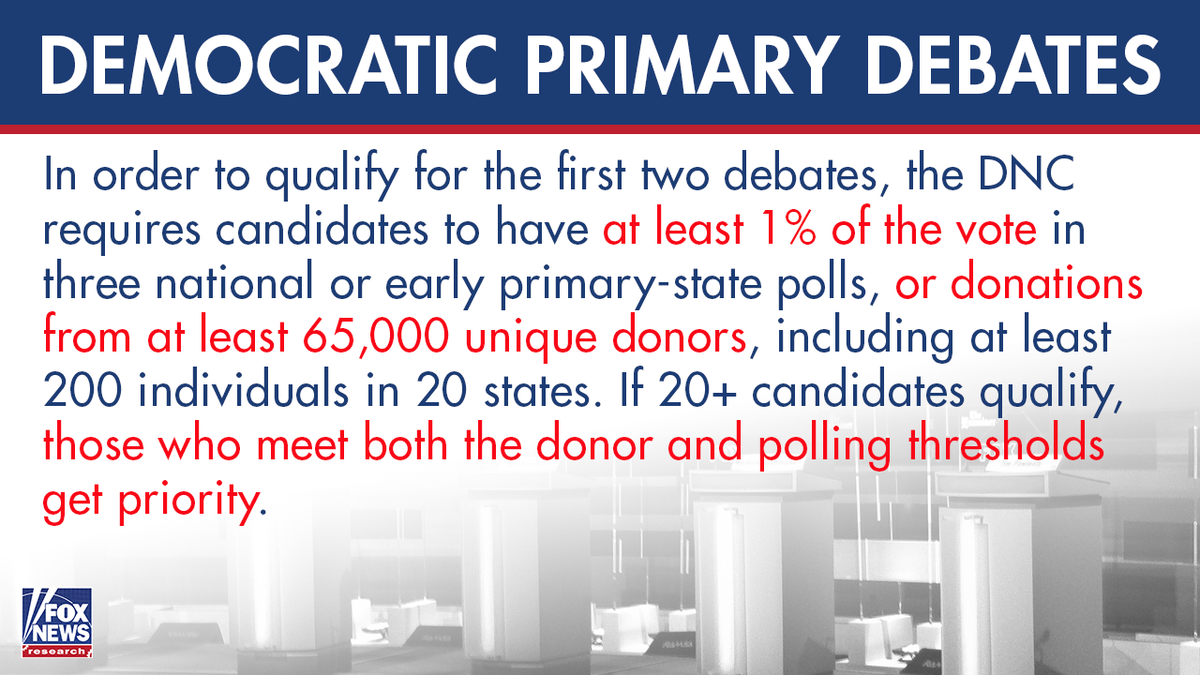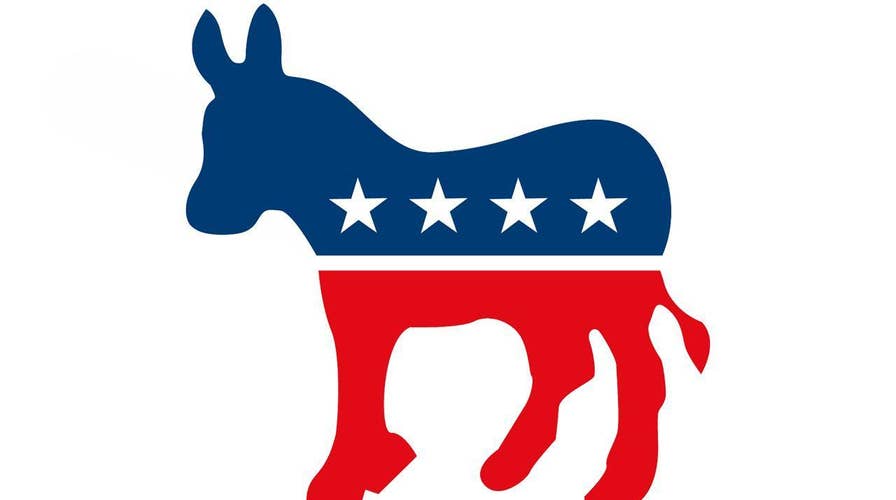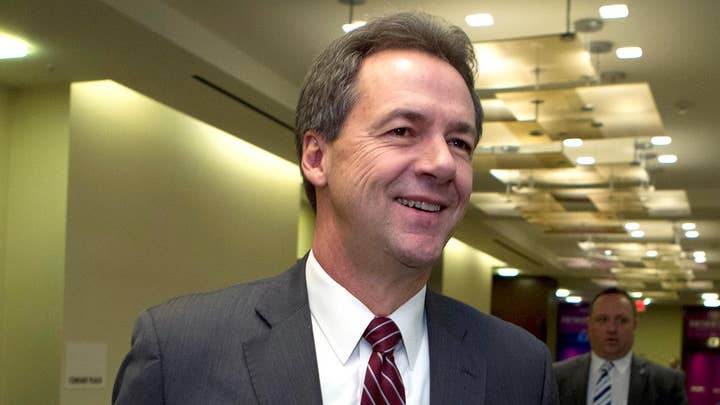Trailing 2020 Democratic candidates angry over new debate rules
Will this become a bigger issue as debate nears? Democratic strategists Jonathan Harris and Jason Nichols weigh in.
Call it the debate before the debates.
With the deadline just a day away for the 2020 White House hopefuls to qualify for the first two rounds of primary debates organized by the Democratic National Committee, some of the candidates still gunning to make the stage are getting increasingly frustrated with the DNC’s criteria.
And with the national party committee recently announcing it will make it harder for the contenders to make the cut for the third and fourth rounds of debates – by raising the thresholds that must be cleared – some of the lower-tier contenders are blasting the DNC for “winnowing the field.”
The presidential candidates have until Wednesday to cross one of two thresholds to qualify for the first two rounds, which will be held later this month and in late July.
So far, 14 candidates have reached both the polling and donor criteria, guaranteeing them one of the 20 spots available. But with an historically enormous field of nearly two-dozen contenders, some will fail to make the stage.
Among them is Montana Gov. Steve Bullock, one of the last candidates to jump into the race. His campaign slammed the DNC’s “obscure rules.”
Matt McKenna, a veteran Democratic strategist who’s advising Bullock, told Fox News: “Governor Bullock got in the race late because he was doing something only a handful of people in the field seem to spend any time doing — governing. Because he decided to do his job, 100,000 Montanans have healthcare. If he had to make that decision again, to expand Medicaid or make sure he bent to the DNC’s obscure rules, he wouldn’t do anything differently.”
Also likely not to make the cut is Rep. Seth Moulton of Massachusetts.
“No, I’m not going to make the first debate, but I knew that, getting in so late. But I think that’s OK,” Moulton explained last week on Hugh Hewitt’s nationally syndicated radio show. “This first debate’s going to have 20 people. Folks are barely going to get a chance to speak.”
Trying to downplay missing out on a chance to take part in debates that will be viewed by millions of Americans, Moulton argued that the nomination’s “not going to be decided by the Democratic National Committee in their debates. It’s going to get decided by the American people.”
Also likely to sit out – Miramar, Fla., Mayor Wayne Messam, who’s virtually unknown.
THE LATEST 2020 DEVELOPMENTS FROM FOX NEWS
The thresholds for the first two debates – announced by the DNC in January, include reaching 1 percent in three polls recognized by the national party committee, or receiving contributions from a minimum 65,000 unique donors as well as 200 unique donors in at least 20 states.
Sen. Kirsten Gillibrand of New York this past weekend became the 14th candidate to reach both criteria, as she passed the 65,000 individual contributors mark.
“They are tough rules to follow, so you’ve got to earn them,” she told Fox News.

The others guaranteed a spot in one of the two back-to-back prime time debates -- featuring 10 candidates each night -- are former Vice President Joe Biden; Sens. Bernie Sanders of Vermont, Elizabeth Warren of Massachusetts, Kamala Harris of California, Cory Booker of New Jersey, and Amy Klobuchar of Minnesota; South Bend, Ind., Mayor Pete Buttigieg; former Rep. Beto O’Rourke of Texas; former San Antonio Mayor and former Housing and Urban Development Secretary Julian Castro; Rep. Tulsi Gabbard of Hawaii; and Washington state Gov. Jay Inslee.
Joining them on the debate stages are two lesser-known contenders – entrepreneur Andrew Yang and best-selling spiritual author Marianne Williamson.
Reaching one of the two thresholds – the polling criteria – appear to be Sen. Michael Bennet of Colorado, former Colorado Gov. John Hickenlooper, Rep. Tim Ryan of Ohio, Rep. Eric Swalwell of California, former Rep. John Delaney of Maryland, and New York City Mayor Bill de Blasio.
But the DNC’s raising the bar to make the third and fourth rounds – which will be held in September and October. Candidates must receive contributions from a minimum 130,000 unique donors, as well as 400 unique donors in at least 20 states. And they must crack at least 2 percent in four polls accepted by the national committee.
The upping of the ante is infuriating those candidates who worked hard just to make the cut for the first two rounds.
“I don’t think the DNC should be winnowing the field early in the process,” Bennet told Fox News last month. ”They have to pick some metrics of some kind. I hope the metrics that they have picked turn out to put the strongest candidates on the debate stage."
Ryan agreed, telling Fox News “to start winnowing the field this early in the process I think isn’t the best way to go about doing it, because you need a chance for the American people to see you.”
While Ryan added that “it’s probably a little premature to start cutting people off,” he noted that “it is what it is. The rules are what they are. I’m not going to complain about them.”
Also frustrated is Delaney, who’s largely self-financing his campaign.
Last week he wrote a letter to the DNC calling for more transparency in revealing how they determined the criteria.
“The DNC is playing a gate-keeping function and they’re creating a filter to determine which candidates can make their arguments to the American people,” he charged.
Williamson struck a similar note, telling Fox News last month that “I don’t believe the political parties should be gatekeepers. They should be conduits and channels that should serve the process, not design the process.”
Castro, in an interview with Fox News last week, warned that “the DNC needs to be careful about the timing of any type of winnowing that happens…they need to be careful not to do the business that the people themselves are going to do.”
And de Blasio told NY1 on Monday night that “I do hope the DNC remembers that we’re always better off being inclusive.”
For the DNC, grappling with nearly two-dozen candidates is uncharted waters. The Democratic field easily topped the then-record 18 Republicans running for the GOP’s 2016 presidential nomination.
DNC Chairman Tom Perez called the threshold-raising a normal procedure.
"If you can't run an effective grassroots campaign in the year 2020, in today's era, you're not going to be able to win the presidency," Perez told CBS News. "And what our dual threshold has done is to give additional opportunity to the candidates."
"What we wanted to do was make sure that we had multiple opportunities where they could present their vision to the American people. And then, as it happens in every primary cycle, you've got to demonstrate progress, and that's what September is about," he added.
A number of the candidates aren’t arguing with the DNC.
Among them is Klobuchar.
“I’m OK with it,” she told Fox News on Monday, while campaigning in the first-in-the-nation primary state of New Hampshire.
While she highlighted that “I do like to have open, free debates,” the senator suggested that nearly two-dozen candidates may be too overwhelming for primary voters.
“I think that for voters…it’s hard to make a decision when you have so many people in it,” she explained. “I think it is important as we get closer and closer to Iowa and New Hampshire and South Carolina and Nevada, that people are able to choose and listen to the candidates and see them debate each other, not just on consecutive nights.”
It’s not just the debate criteria that’s upsetting some of the candidates. It’s also the issues being debated.
Inslee, who’s made combating climate change the top issue in his presidential campaign, is frustrated that the DNC said no to his pitch to hold a debate solely on global warming.
“This is deeply disappointing,” Inslee said. “The DNC is silencing the voices of Democratic activists, many of our progressive partner organizations, and nearly half of the Democratic presidential field, who want to debate the existential crisis of our time. Democratic voters say that climate change is their top issue.”














































